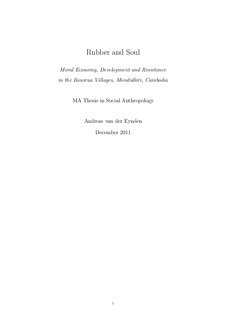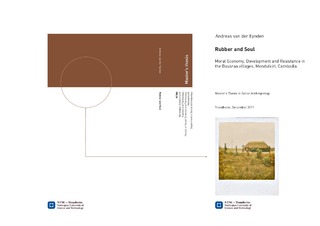| dc.contributor.advisor | Cañás Bottos, Lorenzo | nb_NO |
| dc.contributor.author | van der Eynden, Andreas | nb_NO |
| dc.date.accessioned | 2014-12-19T14:43:52Z | |
| dc.date.available | 2014-12-19T14:43:52Z | |
| dc.date.created | 2012-03-07 | nb_NO |
| dc.date.issued | 2011 | nb_NO |
| dc.identifier | 507943 | nb_NO |
| dc.identifier.uri | http://hdl.handle.net/11250/271369 | |
| dc.description.abstract | This thesis deals with the establishemnt of the rubber plantation Varanasi in the Bousraa village complex, Mondulkiri Province, Cambodia. The land that the project is changing from forest to plantation has been used by the Bunong, an indigenous group practicing swidden agriculture, for generations. The establishment of the plantation has led to protests, sabotage actions, the generation of dierence in the community and the dispossession of villagers, all in the name of "economic development". The central argument is that by applying the moral economy concept to the Bunong, their relationship to land can be seen as complex and "total", while the idea behind the plantation is to tap an untapped set of resources for commodity production - a purely profit-oriented outlook. This leads to the concept of "development" losing all meaning in context of the case: it becomes obvious that a rethinking of what development is and should be is necessary. | nb_NO |
| dc.language | eng | nb_NO |
| dc.publisher | Norges teknisk-naturvitenskapelige universitet, Fakultet for samfunnsvitenskap og teknologiledelse, Sosialantropologisk institutt | nb_NO |
| dc.subject | Social and Behavioural Science, Law | en_GB |
| dc.title | Rubber and Soul: Moral Economy, Development and Resistance in the Bousraa villages, Mondulkiri, Cambodia | nb_NO |
| dc.type | Master thesis | nb_NO |
| dc.contributor.department | Norges teknisk-naturvitenskapelige universitet, Fakultet for samfunnsvitenskap og teknologiledelse, Sosialantropologisk institutt | nb_NO |

